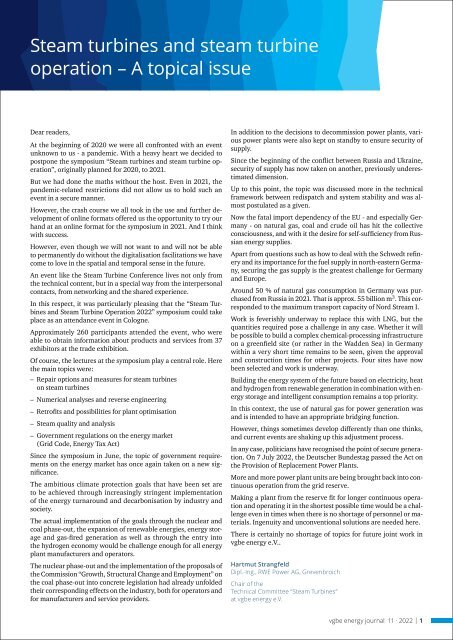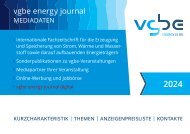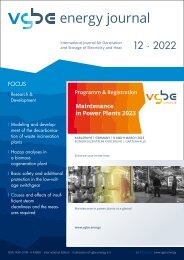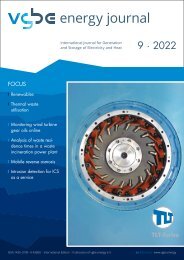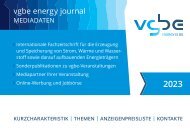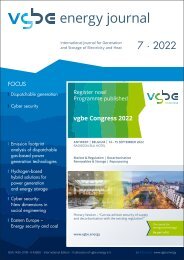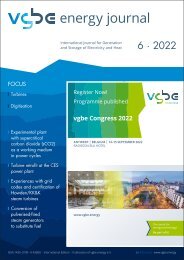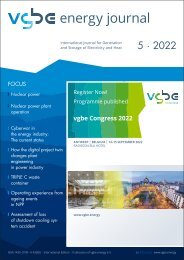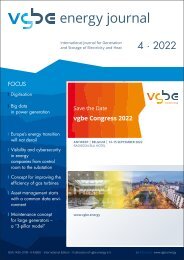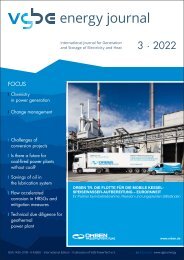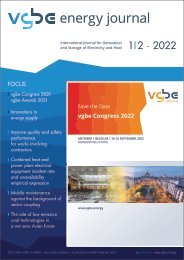vgbe energy journal 11 (2022) - International Journal for Generation and Storage of Electricity and Heat
vgbe energy journal - International Journal for Generation and Storage of Electricity and Heat. Issue 11 (2022). Technical Journal of the vgbe energy e.V. - Energy is us! NOTICE: Please feel free to read this free copy of the vgbe energy journal. This is our temporary contribution to support experience exchange in the energy industry during Corona times. The printed edition, subscription as well as further services are available on our website, www.vgbe.energy +++++++++++++++++++++++++++++++++++++++++++++++++++++++
vgbe energy journal - International Journal for Generation and Storage of Electricity and Heat.
Issue 11 (2022).
Technical Journal of the vgbe energy e.V. - Energy is us!
NOTICE: Please feel free to read this free copy of the vgbe energy journal. This is our temporary contribution to support experience exchange in the energy industry during Corona times. The printed edition, subscription as well as further services are available on our website, www.vgbe.energy
+++++++++++++++++++++++++++++++++++++++++++++++++++++++
- Keine Tags gefunden...
Erfolgreiche ePaper selbst erstellen
Machen Sie aus Ihren PDF Publikationen ein blätterbares Flipbook mit unserer einzigartigen Google optimierten e-Paper Software.
Steam turbines <strong>and</strong> steam turbine<br />
operation – A topical issue<br />
Dear readers,<br />
At the beginning <strong>of</strong> 2020 we were all confronted with an event<br />
unknown to us - a p<strong>and</strong>emic. With a heavy heart we decided to<br />
postpone the symposium “Steam turbines <strong>and</strong> steam turbine operation”,<br />
originally planned <strong>for</strong> 2020, to 2021.<br />
But we had done the maths without the host. Even in 2021, the<br />
p<strong>and</strong>emic-related restrictions did not allow us to hold such an<br />
event in a secure manner.<br />
However, the crash course we all took in the use <strong>and</strong> further development<br />
<strong>of</strong> online <strong>for</strong>mats <strong>of</strong>fered us the opportunity to try our<br />
h<strong>and</strong> at an online <strong>for</strong>mat <strong>for</strong> the symposium in 2021. And I think<br />
with success.<br />
However, even though we will not want to <strong>and</strong> will not be able<br />
to permanently do without the digitalisation facilitations we have<br />
come to love in the spatial <strong>and</strong> temporal sense in the future.<br />
An event like the Steam Turbine Conference lives not only from<br />
the technical content, but in a special way from the interpersonal<br />
contacts, from networking <strong>and</strong> the shared experience.<br />
In this respect, it was particularly pleasing that the “Steam Turbines<br />
<strong>and</strong> Steam Turbine Operation <strong>2022</strong>” symposium could take<br />
place as an attendance event in Cologne.<br />
Approximately 260 participants attended the event, who were<br />
able to obtain in<strong>for</strong>mation about products <strong>and</strong> services from 37<br />
exhibitors at the trade exhibition.<br />
Of course, the lectures at the symposium play a central role. Here<br />
the main topics were:<br />
––<br />
Repair options <strong>and</strong> measures <strong>for</strong> steam turbines<br />
on steam turbines<br />
––<br />
Numerical analyses <strong>and</strong> reverse engineering<br />
––<br />
Retr<strong>of</strong>its <strong>and</strong> possibilities <strong>for</strong> plant optimisation<br />
––<br />
Steam quality <strong>and</strong> analysis<br />
––<br />
Government regulations on the <strong>energy</strong> market<br />
(Grid Code, Energy Tax Act)<br />
Since the symposium in June, the topic <strong>of</strong> government requirements<br />
on the <strong>energy</strong> market has once again taken on a new significance.<br />
The ambitious climate protection goals that have been set are<br />
to be achieved through increasingly stringent implementation<br />
<strong>of</strong> the <strong>energy</strong> turnaround <strong>and</strong> decarbonisation by industry <strong>and</strong><br />
society.<br />
The actual implementation <strong>of</strong> the goals through the nuclear <strong>and</strong><br />
coal phase-out, the expansion <strong>of</strong> renewable energies, <strong>energy</strong> storage<br />
<strong>and</strong> gas-fired generation as well as through the entry into<br />
the hydrogen economy would be challenge enough <strong>for</strong> all <strong>energy</strong><br />
plant manufacturers <strong>and</strong> operators.<br />
The nuclear phase-out <strong>and</strong> the implementation <strong>of</strong> the proposals <strong>of</strong><br />
the Commission “Growth, Structural Change <strong>and</strong> Employment” on<br />
the coal phase-out into concrete legislation had already unfolded<br />
their corresponding effects on the industry, both <strong>for</strong> operators <strong>and</strong><br />
<strong>for</strong> manufacturers <strong>and</strong> service providers.<br />
In addition to the decisions to decommission power plants, various<br />
power plants were also kept on st<strong>and</strong>by to ensure security <strong>of</strong><br />
supply.<br />
Since the beginning <strong>of</strong> the conflict between Russia <strong>and</strong> Ukraine,<br />
security <strong>of</strong> supply has now taken on another, previously underestimated<br />
dimension.<br />
Up to this point, the topic was discussed more in the technical<br />
framework between redispatch <strong>and</strong> system stability <strong>and</strong> was almost<br />
postulated as a given.<br />
Now the fatal import dependency <strong>of</strong> the EU - <strong>and</strong> especially Germany<br />
- on natural gas, coal <strong>and</strong> crude oil has hit the collective<br />
consciousness, <strong>and</strong> with it the desire <strong>for</strong> self-sufficiency from Russian<br />
<strong>energy</strong> supplies.<br />
Apart from questions such as how to deal with the Schwedt refinery<br />
<strong>and</strong> its importance <strong>for</strong> the fuel supply in north-eastern Germany,<br />
securing the gas supply is the greatest challenge <strong>for</strong> Germany<br />
<strong>and</strong> Europe.<br />
Around 50 % <strong>of</strong> natural gas consumption in Germany was purchased<br />
from Russia in 2021. That is approx. 55 billion m 3 . This corresponded<br />
to the maximum transport capacity <strong>of</strong> Nord Stream I.<br />
Work is feverishly underway to replace this with LNG, but the<br />
quantities required pose a challenge in any case. Whether it will<br />
be possible to build a complex chemical-processing infrastructure<br />
on a greenfield site (or rather in the Wadden Sea) in Germany<br />
within a very short time remains to be seen, given the approval<br />
<strong>and</strong> construction times <strong>for</strong> other projects. Four sites have now<br />
been selected <strong>and</strong> work is underway.<br />
Building the <strong>energy</strong> system <strong>of</strong> the future based on electricity, heat<br />
<strong>and</strong> hydrogen from renewable generation in combination with <strong>energy</strong><br />
storage <strong>and</strong> intelligent consumption remains a top priority.<br />
In this context, the use <strong>of</strong> natural gas <strong>for</strong> power generation was<br />
<strong>and</strong> is intended to have an appropriate bridging function.<br />
However, things sometimes develop differently than one thinks,<br />
<strong>and</strong> current events are shaking up this adjustment process.<br />
In any case, politicians have recognised the point <strong>of</strong> secure generation.<br />
On 7 July <strong>2022</strong>, the Deutscher Bundestag passed the Act on<br />
the Provision <strong>of</strong> Replacement Power Plants.<br />
More <strong>and</strong> more power plant units are being brought back into continuous<br />
operation from the grid reserve.<br />
Making a plant from the reserve fit <strong>for</strong> longer continuous operation<br />
<strong>and</strong> operating it in the shortest possible time would be a challenge<br />
even in times when there is no shortage <strong>of</strong> personnel or materials.<br />
Ingenuity <strong>and</strong> unconventional solutions are needed here.<br />
There is certainly no shortage <strong>of</strong> topics <strong>for</strong> future joint work in<br />
<strong>vgbe</strong> <strong>energy</strong> e.V..<br />
Hartmut Strangfeld<br />
Dipl.-Ing., RWE Power AG, Grevenbroich<br />
Chair <strong>of</strong> the<br />
Technical Committee “Steam Turbines”<br />
at <strong>vgbe</strong> <strong>energy</strong> e.V.<br />
<strong>vgbe</strong> <strong>energy</strong> <strong>journal</strong> <strong>11</strong> · <strong>2022</strong> | 1


